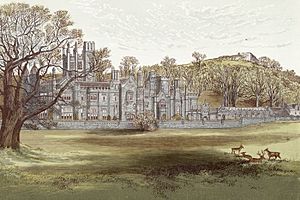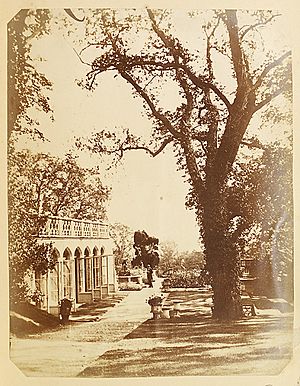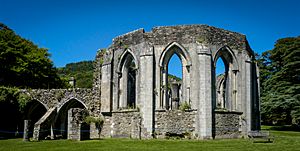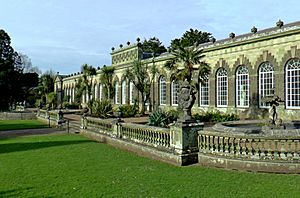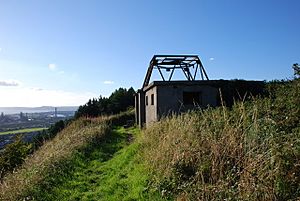Margam Country Park facts for kids
Quick facts for kids Margam County Park |
|
|---|---|
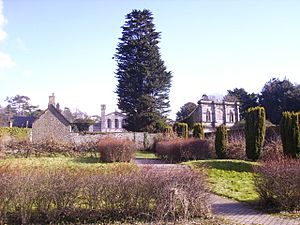
View from the Orangery Gardens
|
|
| Type | Country Park |
| Location | Margam, Neath Port Talbot, Wales |
| Created | 1977 |
| Operated by | Neath Port Talbot County Borough Council |
| Status | Open all year |
| Parking | Paid parking |
| Website | Official website: http://www.margamcountrypark.co.uk |
Margam Country Park is a huge park in Wales, covering about 850 acres (3.4 square kilometers). It's located in Margam, just 2 miles (3 km) from Port Talbot in south Wales. This amazing park was once owned by the Mansel Talbot family. Today, the local council, Neath Port Talbot County Borough Council, looks after it.
Inside the park, you'll find three very special buildings:
- Margam Abbey: This was once a Cistercian monastery.
- Margam Castle: A grand, old-fashioned house that used to be home to the Mansel Talbot family.
- The Orangery: A beautiful building from the 1700s.
Contents
Discover Margam Park's History
Margam Park's story began with a monastery. Sir Rice Mansel took over the monastery in 1540. Later, he built a large Tudor house where the monastery used to be.
Gardens were first mentioned in 1661. By 1727, the park had many plants. The beautiful Orangery was finished in 1793. It was designed by a famous architect named Anthony Keck. Later, fences were put up to keep deer out of the gardens.
In the 1800s, the park grew even more. Maps from 1814 show different areas like the 'Great' and 'Little' Parks. In 1830, work started on a new manor house, which became Margam Castle. More features were added, like the Temple of the Four Seasons.
The park became public in 1977. This means everyone can now visit and enjoy its beauty!
Amazing Animals at Margam
Margam Park is famous for its many peacocks. You'll often see them roaming around!
The park is also home to many deer. Deer have lived here since Norman times! Most of them are fallow deer, with about 230 of them. There are also about 60 red deer. Around 30 Père David's deer were brought here in the 1990s. These rare deer are part of a special program to help them breed.
You can also see birds of prey in aviaries. These are birds that have been rescued. The park also raises a rare type of cow called Glamorgan cattle.
Explore the Park: Walks and Fun
Margam Country Park has many paths for walking. Long-distance trails like the Coed Morgannwg Way start or finish here. A part of the Wales Coast Path also goes through the park. There are also shorter walks, less than three miles long, that are clearly marked.
While there are no big rivers, the park has lakes and ponds. You can even fish in some of them!
During summer, you can ride the Margam Park Railway. It's a small narrow gauge train that takes visitors around the grounds. The Orangery is a popular place for weddings.
The park hosts many events in summer. These include fairs and car rallies. The Margam Country Show is a big event held in August. In 2003, the park hosted the Urdd Eisteddfod, a big Welsh festival.
In 2013, Margam Park was voted the UK's favorite park with a Green Flag Award. This shows how special it is!
You can enter the park for free, but there's a charge for parking and some events.
The park has also been used for the Wales Rally GB. This is a famous car rally where drivers race through the park.
Historic Sites in the Park
Margam Country Park has six Scheduled Ancient Monuments. These are important historical sites. They include two Iron Age hill forts, two medieval religious sites, a museum, and a World War II building.
Iron Age Hill Forts
Mynydd y Castell Camp
This is a large hill fort shaped like a 'D'. It covers about 2.7 hectares (6.7 acres) on a hill near Margam Abbey. It was built a long time ago in the Iron Age.
Half Moon Camp
This is a smaller hill fort on a hilltop north of Margam Abbey. It's on the other side of the valley from Mynydd y Castell. The Wales Coast Path crosses this fort.
Margam Abbey: A Medieval Treasure
Margam Abbey was built in 1147. When the abbey was closed down in 1536, the main church part became Margam Parish Church. The ruins of other abbey buildings are still in the park today. One amazing ruin is a twelve-sided Chapter House.
There's also a small chapel called Hen Eglwys, built around 1470. It was part of the Abbey and offered a great view for the 19th-century park.
Margam Stones Museum
In the 1800s, the Talbot family collected old Christian memorial stones from the area. They placed them near the Abbey Chapter House. In 1932, these stones were moved into a schoolroom nearby. This became the Margam Stones Museum, which is now looked after by Cadw.
Margam Castle: A Grand Home
The park is also home to Margam Castle. This grand house was built by Christopher Rice Mansel Talbot in the early 1800s. You can find sculptures and artwork along the paths that connect the castle to the Orangery.
World War II Radar Station
High up on a hill above the motorway, you can see an old radar station. This was part of a network built during World War II from 1941. These stations helped detect German bombers and ships. Margam's station was a "Chain Home Low" station, designed to spot low-flying planes and ships.
This radar station is a Scheduled Ancient Monument. The Wales Coast Path runs right past it. You can see three flat-topped buildings that once held generators and control equipment. They had a large antenna on the roof, looking out over Port Talbot and Swansea Bay.
Images for kids
 | Isaac Myers |
 | D. Hamilton Jackson |
 | A. Philip Randolph |


